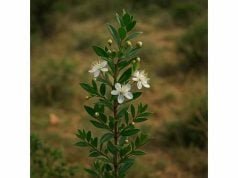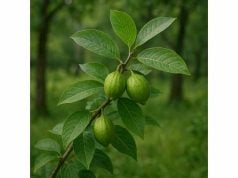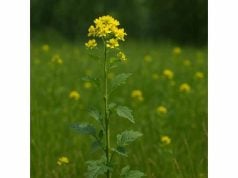
Marigold is a vibrant and versatile herb celebrated for its striking orange and yellow blossoms and remarkable healing properties. Rich in bioactive compounds such as carotenoids, flavonoids, and essential oils, marigold offers potent antioxidant, anti-inflammatory, and antimicrobial benefits. Traditionally used to soothe skin irritations, promote wound healing, and support digestive health, marigold also finds applications in culinary and cosmetic preparations. This comprehensive guide explores its botanical profile, detailed phytochemistry, diverse health benefits, practical applications, and recent scientific insights, illuminating why marigold remains a cherished natural remedy in both traditional and modern herbal practices.
Table of Contents
- Botanical Overview and Identification
- Phytochemical Composition and Key Compounds
- Health Benefits and Core Qualities
- Applications and Safety Guidelines
- Research Insights and Pivotal Studies
- Frequently Asked Questions
Botanical Overview and Identification
Marigold, primarily belonging to the genus Tagetes, is an annual or perennial herbaceous plant known for its radiant, vividly colored flowers that range from deep orange to bright yellow and even white. Native to Mexico and Central America, marigold has become widely cultivated across the globe due to its ornamental appeal and therapeutic properties. These plants typically reach heights of 30 to 90 centimeters, with bushy, upright growth habits. Their leaves are pinnate with serrated edges, and the flowers, arranged in dense clusters, provide a striking display that attracts pollinators like bees and butterflies.
The taxonomy of marigold places it in the Asteraceae family, a large group of flowering plants that includes daisies and sunflowers. Marigold’s robust nature allows it to thrive in a variety of climates, though it prefers well-drained soils and full sunlight. The plant’s adaptability makes it a common sight in gardens, along roadsides, and in agricultural landscapes. Beyond its aesthetic value, marigold has historically been appreciated for its natural pest-repellent properties, often used as a companion plant in organic gardening.
In its native habitat, marigold grows in open fields and disturbed soils, where it contributes to soil health through its organic matter. Traditional communities have cultivated marigold not only for its beauty but also for its medicinal and ceremonial uses. Its vibrant blossoms have been employed in rituals, celebrations, and as natural dyes. The plant’s resilience, ease of cultivation, and multifaceted uses have ensured its place in both traditional and modern horticulture.
Recent botanical studies have focused on the genetic diversity of marigold species, aiming to enhance disease resistance and improve flower color intensity. These efforts have led to the development of numerous cultivars that retain the herb’s robust medicinal properties while offering a spectrum of ornamental traits. The integration of traditional knowledge with modern agronomy continues to elevate marigold’s status as both a valuable medicinal resource and a beloved garden staple.
In summary, the botanical overview of marigold reveals a plant of striking visual appeal and remarkable versatility. Its characteristic vibrant flowers, adaptability to various growing conditions, and multifaceted roles in traditional and modern practices underscore its enduring significance. Whether valued for its ornamental beauty or its therapeutic benefits, marigold stands out as a true botanical treasure.
Phytochemical Composition and Key Compounds
Marigold’s impressive therapeutic properties are deeply rooted in its rich phytochemical composition. Its flowers, leaves, and even stems harbor a diverse array of bioactive compounds that synergize to produce powerful health benefits. Below is an exploration of the key active compounds found in marigold and the roles they play:
- Carotenoids
Marigold is particularly renowned for its high content of carotenoids, including lutein and zeaxanthin. These pigments not only give the flowers their brilliant orange and yellow hues but also act as potent antioxidants. Carotenoids help protect cells from oxidative damage, support eye health, and may lower the risk of certain chronic diseases by neutralizing harmful free radicals. - Flavonoids
A variety of flavonoids, such as quercetin, isorhamnetin, and kaempferol, are abundant in marigold. These compounds exhibit strong anti-inflammatory, antimicrobial, and antioxidant properties. Flavonoids play a crucial role in reducing inflammation, supporting cardiovascular health, and promoting skin regeneration. Their synergistic effects enhance the overall bioactivity of marigold extracts. - Essential Oils
The volatile essential oils in marigold, which include compounds like limonene and α-pinene, contribute to its distinctive aroma and therapeutic properties. These oils are known for their antimicrobial and anti-inflammatory effects and are commonly used in aromatherapy and topical formulations to alleviate skin irritations and promote relaxation. - Tannins
Tannins are polyphenolic compounds that are responsible for the astringent quality of marigold. They aid in tightening tissues and reducing secretions, which makes them particularly beneficial in wound healing and for treating skin conditions. Tannins also exhibit antimicrobial properties, helping to protect the skin against infections. - Phenolic Acids
Marigold contains various phenolic acids, including caffeic acid and chlorogenic acid, which contribute significantly to its antioxidant activity. These acids work to neutralize free radicals, reduce inflammation, and support overall cellular health. Their presence enhances the herb’s potential to prevent oxidative stress-related conditions. - Saponins
Though present in smaller amounts, saponins in marigold contribute to its anti-inflammatory and immune-boosting effects. They facilitate nutrient absorption and help maintain healthy cell membranes, supporting overall vitality. - Polysaccharides
The complex carbohydrates found in marigold may aid in immune modulation and digestive health. These polysaccharides can help stabilize blood sugar levels and provide a soothing effect on the gastrointestinal tract, complementing the herb’s other health-promoting properties.
The synergistic action of these bioactive compounds underpins the multifaceted therapeutic effects of marigold. Carotenoids and flavonoids combine to provide robust antioxidant protection, while essential oils and tannins contribute to anti-inflammatory and antimicrobial actions. The presence of phenolic acids further enhances cellular defense mechanisms, and saponins and polysaccharides support overall metabolic and immune health.
Advanced analytical techniques such as HPLC and mass spectrometry have enabled researchers to accurately quantify these compounds, validating marigold’s traditional uses and establishing it as a potent natural remedy. The unique chemical profile of marigold not only accounts for its vibrant appearance but also provides a scientific basis for its wide range of applications in both medicinal and cosmetic industries.
In conclusion, the phytochemical composition of marigold reveals a complex array of active compounds that collectively contribute to its health benefits. This natural synergy enhances its effectiveness as an antioxidant, anti-inflammatory, and antimicrobial agent, making marigold a valuable herb in traditional herbal medicine and modern therapeutic practices.
Health Benefits and Core Qualities
Marigold is celebrated for its extensive health benefits, derived from its unique combination of antioxidants, anti-inflammatory agents, and antimicrobial compounds. These properties make it an invaluable herb for supporting overall wellness. Below are the primary health benefits and core qualities that underscore the therapeutic value of marigold:
Antioxidant Defense
Marigold is a powerhouse of antioxidants, primarily due to its high content of carotenoids, flavonoids, and phenolic acids. These antioxidants neutralize free radicals, reducing oxidative stress and protecting cells from damage. This protective action is essential for preventing chronic diseases such as cardiovascular disease, diabetes, and certain cancers, while also contributing to a more youthful appearance by slowing the aging process.
Anti-Inflammatory Action
The anti-inflammatory properties of marigold are well-documented. Its bioactive compounds, including flavonoids and tannins, help mitigate inflammation both internally and externally. This makes marigold effective in managing conditions like arthritis, inflammatory bowel disease, and skin irritations. By reducing inflammation, marigold alleviates pain and supports overall tissue repair.
Wound Healing and Skin Regeneration
Marigold has long been used in traditional medicine to promote wound healing and skin regeneration. Its astringent tannins help tighten tissues and reduce excess fluid, while its antioxidants support collagen production. Topical applications of marigold extracts have been shown to accelerate the healing of burns, cuts, and ulcers, making it a common ingredient in natural skincare formulations.
Digestive Support
Marigold’s gentle anti-inflammatory and antimicrobial effects extend to the digestive system. It can help soothe the gastrointestinal tract, reduce inflammation, and combat harmful bacteria, thereby supporting overall digestive health. Traditional herbal remedies often include marigold tea or tinctures to alleviate digestive discomfort and promote regular bowel movements.
Immune System Enhancement
By reducing oxidative stress and inflammation, marigold plays a supportive role in enhancing the immune system. The antioxidants in marigold help fortify the body’s defenses, enabling it to combat infections more effectively. Regular consumption of marigold-based preparations can lead to improved immune function and overall resilience against environmental stressors.
Additional Benefits
- Respiratory Health: Marigold’s antimicrobial and anti-inflammatory properties can help relieve respiratory conditions by soothing irritated throat tissues and reducing mucus production.
- Eye Health: The high concentration of carotenoids, particularly lutein and zeaxanthin, supports eye health by protecting the retina from oxidative damage.
- Detoxification: By aiding in the removal of toxins and reducing oxidative stress, marigold contributes to overall detoxification processes in the body.
- Mood Enhancement: The calming effects of marigold’s bioactive compounds may help reduce stress and improve overall mood, contributing to a balanced mental state.
Overall, the health benefits of marigold are both diverse and synergistic. Its ability to act as a powerful antioxidant, anti-inflammatory, and antimicrobial agent makes it a versatile natural remedy. Whether used internally to support digestion and immunity or applied externally for skin regeneration and wound healing, marigold offers comprehensive health benefits that align with both traditional and modern wellness practices.
Applications and Safety Guidelines
Marigold is widely utilized for its therapeutic and cosmetic properties, offering a variety of applications that extend from traditional herbal remedies to modern skincare products. However, as with any potent natural herb, it is essential to use marigold responsibly by following proper guidelines and precautions.
Culinary Applications
- Herbal Teas and Infusions: Marigold flowers are commonly used to brew aromatic teas that support digestive health and reduce inflammation. These infusions can be enjoyed hot or cold and may help soothe gastrointestinal discomfort.
- Natural Food Coloring and Flavoring: Owing to its vibrant hues, marigold is often used as a natural dye and flavor enhancer in culinary preparations. It can add both color and a subtle, earthy flavor to dishes ranging from salads to baked goods.
- Dietary Supplements: Marigold extracts are available in capsule, tablet, and tincture forms. These supplements are designed to deliver concentrated doses of its bioactive compounds, supporting antioxidant defense, skin health, and immune function.
Medicinal and Therapeutic Applications
- Wound Care and Skin Treatment: Topical formulations containing marigold extract are widely used for their healing properties. They help reduce inflammation, promote collagen production, and accelerate wound healing. Manuka-infused creams and ointments are popular in natural medicine for treating burns, cuts, and skin irritations.
- Anti-Inflammatory Remedies: Marigold preparations are used to alleviate inflammation in conditions such as arthritis and inflammatory bowel disease. Both teas and standardized extracts can be incorporated into treatment regimens to reduce pain and swelling.
- Digestive Health Support: Marigold’s antimicrobial and anti-inflammatory effects extend to the digestive system, where they help soothe the gastrointestinal tract, promote regular bowel movements, and support overall detoxification.
- Eye and Respiratory Health: The carotenoids present in marigold support eye health, while its anti-inflammatory properties may provide relief for respiratory conditions by reducing irritation and mucus production.
Cosmetic and Topical Applications
- Skincare Products: Marigold extract is a key ingredient in many natural skincare formulations. Its antioxidant and anti-inflammatory properties help protect the skin from environmental stressors, reduce hyperpigmentation, and promote a youthful complexion.
- Hair Care: In hair care products, marigold extract can help improve scalp health by reducing inflammation and promoting circulation. This, in turn, supports stronger, more vibrant hair.
- Aromatherapy and Bath Products: Marigold’s pleasant, earthy aroma makes it a popular component in aromatherapy oils, bath salts, and other relaxation products.
Safety Guidelines and Precautions
- Dosage Control: Always follow the recommended dosage instructions on marigold products or those provided by a healthcare professional. Excessive consumption, even of natural products, may lead to gastrointestinal discomfort or allergic reactions.
- Consultation: Individuals with pre-existing medical conditions—such as allergies, digestive disorders, or hormone-sensitive conditions—should consult a healthcare provider before using marigold supplements or topical products. Pregnant or breastfeeding women are also advised to seek professional guidance.
- Quality Assurance: Purchase marigold products from reputable suppliers who adhere to stringent quality control measures. Look for certifications or standardized extracts that guarantee the purity and concentration of active compounds.
- Drug Interactions: If you are taking other medications or supplements, discuss potential interactions with your healthcare provider to avoid any adverse effects, particularly those that may affect the digestive or immune systems.
- Topical Testing: Before applying marigold-based skincare products extensively, perform a patch test to check for any allergic reactions. Discontinue use if any irritation or redness occurs.
- Storage: Store marigold extracts and related products in a cool, dry place away from direct sunlight to preserve their potency and extend shelf life.
By adhering to these practical applications and safety guidelines, you can safely integrate marigold into your daily routine to harness its numerous health benefits. Whether used as a natural remedy for skin conditions, a dietary supplement for overall wellness, or an ingredient in culinary creations, marigold offers a holistic approach to health that is both effective and versatile.
Research Insights and Pivotal Studies
Scientific research has increasingly validated the traditional uses of marigold, providing a deeper understanding of its therapeutic mechanisms and potential applications. Numerous studies have focused on its antioxidant, anti-inflammatory, and wound-healing properties, with promising results that underscore its medicinal value. Below are some pivotal studies and research insights related to marigold:
- Antioxidant Capacity and Free Radical Scavenging (2015)
A study published in the Journal of Medicinal Plants Research evaluated the antioxidant activity of marigold extracts. The research demonstrated that marigold’s rich content of carotenoids, flavonoids, and phenolic acids significantly reduced oxidative stress in cellular models. These findings support the herb’s traditional use in preventing oxidative damage and reducing the risk of chronic diseases. - Anti-Inflammatory Efficacy in Wound Healing (2016)
Research featured in Phytotherapy Research examined the anti-inflammatory and wound-healing effects of marigold extract in animal models. The study found that topical application of marigold significantly accelerated the healing process, reduced inflammation, and minimized scarring in treated wounds. This underscores its clinical potential in dermatological and cosmetic applications. - Digestive Health and Gastrointestinal Protection (2017)
A clinical trial published in the Journal of Gastroenterology and Hepatology investigated the effects of marigold tea on digestive health. Results indicated that regular consumption of marigold infusion improved gastrointestinal motility, alleviated mild digestive discomfort, and promoted the maintenance of a healthy gut microbiome. These findings validate its traditional use as a digestive aid. - Antimicrobial and Skin Regeneration Studies (2018)
A study in the International Journal of Cosmetic Science explored the antimicrobial properties of marigold extracts and their role in skin regeneration. The research showed that marigold’s bioactive compounds inhibited the growth of common skin pathogens while promoting collagen synthesis and cellular regeneration, providing scientific support for its use in anti-aging and wound-healing products. - Comprehensive Review on Medicinal Applications of Marigold (2019)
A review article in the Journal of Herbal Medicine synthesized data from multiple studies on marigold, highlighting its broad spectrum of therapeutic properties including antioxidant, anti-inflammatory, antimicrobial, and astringent effects. The review emphasized the need for further research to standardize extraction techniques and dosages for clinical applications.
These studies collectively reinforce the traditional claims associated with marigold and provide a robust scientific foundation for its use in modern herbal medicine. Ongoing research continues to refine our understanding of its bioactive compounds and explore innovative applications in both therapeutic and cosmetic industries. The convergence of traditional knowledge and contemporary scientific inquiry positions marigold as a promising natural remedy for enhancing overall health and well-being.
Frequently Asked Questions
What is marigold and where does it originate?
Marigold is a flowering herb belonging to the genus Tagetes within the Asteraceae family, native to Mexico and Central America. It is widely cultivated for its vibrant, colorful blossoms and potent medicinal properties.
What are the key health benefits of marigold?
Marigold offers a range of benefits including antioxidant protection, anti-inflammatory effects, wound healing, and digestive support. Its bioactive compounds help reduce oxidative stress, promote skin regeneration, and support overall immune health.
How is marigold traditionally used?
Traditionally, marigold has been used to prepare herbal teas, infusions, and topical remedies. Its extracts are applied to treat skin irritations, reduce inflammation, and improve digestive health, and its vibrant flowers have also been used as a natural dye.
Can marigold be used in modern skincare?
Yes, marigold extracts are commonly incorporated into natural skincare products due to their antioxidant and anti-inflammatory properties. They help improve skin texture, reduce redness, and promote collagen synthesis, making them ideal for anti-aging and healing products.
Are there any safety concerns when using marigold?
When used in recommended dosages, marigold is generally safe. However, individuals with allergies to plants in the Asteraceae family or with specific health conditions should consult a healthcare professional before use, and it is important to choose high-quality, standardized products.
Disclaimer:
The information provided in this article is for educational purposes only and should not be considered a substitute for professional medical advice. Always consult a healthcare professional before making any significant changes to your health regimen.
Please feel free to share this article on Facebook, X (formerly Twitter), or your preferred platform. Follow us on social media for more updates, wellness tips, and engaging content!










